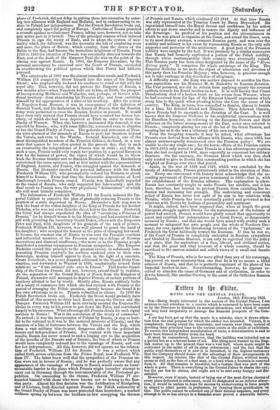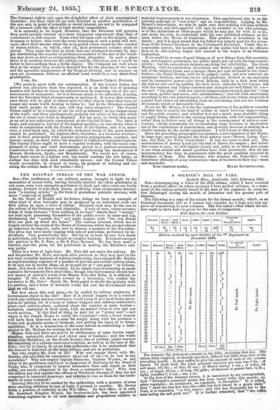Ittttro to tbt
MUSIC AND THE CRYSTAL PALACE.
_London, 16th February 1855.
Sin—Being deeply interested in the success of the Crystal Palace, I inn anxious to call attention to a resolve which is rumoured to have been come to by the 'Directors to diminish its musical attractions, and which if earned out may tend irreparably to damage the financial prospects of the Com- pany.
A cry has been got up that the music is a mistake, since it draws attars Lion from the real purpose for which the edifice was intended. Visitors, it is complained, throng round the musicians, and remain near them, instead of devoting their principal time to the various courts or the stalls of exhibitors. To correct this independent manifestation of taste, a determination is said to have been formed to fritter down the band.
It must be remembered, however that the building was intended not as a partial but as a coherent home of art. The thing most wanted by the Eng- lish nation up to the present time was a vast hall, where music might be cultivated in the midst of all its sister refinements ; and the fact that the public avail themselves of it now it is furnished, is the highest testimony that the Company should desire of the advantage of their arrangements in this respect. An interior like that of the Crystal Palace, without music, seems as dull as the face of a deaf man, or a lawn when a fountain is removed from it. All that remains is beautiful, but a feature that was part of the whole is gone. There is everything in the Crystal Palace to charm the eye ; but the ear has its claims, and ought not to be sent away hungry and dis- satisfied.
Moreover, even if music, instead of being one of the most divine charms of every place dedicated to refinement, could be designated as an inferior attrac- tion, it would be useless to hope for success by endeavouring to force people to attend to other points in preference, by denying them gratification on this. The public cannot be schooled out of their natural impulses, and every attempt to do so has always in a financial sense proved a miserable failure.
The Company rightly rely upon the delightful effect of their contemplated fountains ; but these after all are only intended as another gratification of the eye, and, in point of scientific or moral interest, are not to be compared for a moment with the effect of high musical compositions.
It is earnestly to be hoped, therefore, that the Directors will perceive they could scarcely venture on a more dangerous experiment than that of curtailment iu this respect. From what has been said on the subject, there is reason to believe that even the mere broaching of such a point will seri- ously affect their income when the next period comes round for the renewal of season-tickets; on which, after all, their permanent reliance must be placed. They must also bear in mind, that any attempted economy by sim- ply diminishing the number of performers essential to the size of the build- ing may prove as fatal as extinguishing them altogether. In such a place there is no medium between the sublime and the ridiculous, and it would be better to have nothing than a feeble display. The Company are well aware that in the winter they would be deserted but for the pleasure of the music and the agreeable temperature of the Tropical division, and in summer an open air promenade without an efficient band would be a very short-lived gratification.
[We entirely agree with our correspondent If the Crystal Palace has proved less attractive than was expected, it is an Irish way of mending matters still further to lessen its attractiveness by removing one of the pre- sent sources of enjoyment : for it is because music is too attractive, it seems, that the Directors think of suppressing or spoiling it. It is true that visitors, once there, will be glad to attend more to other objects when they have no longer any music worth hearing to listen to; but do the Directors consider how many people, in that case, will stay away altogether ? The Crystal Palace ought to be a temple of art (as well as industry) in the largest sense of the word; and these gentlemen are probably not aware of the rank which the art of music now holds in England. For our part, we think that music as an art is not sufficiently represented at the Crystal Palace. The band is large, and expensive, but not of the highest quality,—as was shown when it came in competition with the French band of the Guides; and it is, more- over, a wind-band only, by which the orchestral works of the great masters cannot be performed. Its highest effort, therefore, is a favourite overture; and it deals principally with popular operatic arrangements, marches, and dances—music, in short, below the standard of Jullien's Promenade Concerts. The Crystal Palace ought to have a regular orchestra, with the usual com- plement of string and wind instruments, placed in a position acoustically constructed for its reception, and capable of performing the masterpieces of Mozart, Beethoven, Spohr, and Mendelssohn. We would not, of course, throw aside music of a lighter sort, but would combine the two kinds, as Jullien has done with such remarkable success; and the Crystal Palace would accomplish, in respect to music, its purpose of refining and ex- alting the artistic taste of the publie.—En.]



































 Previous page
Previous page